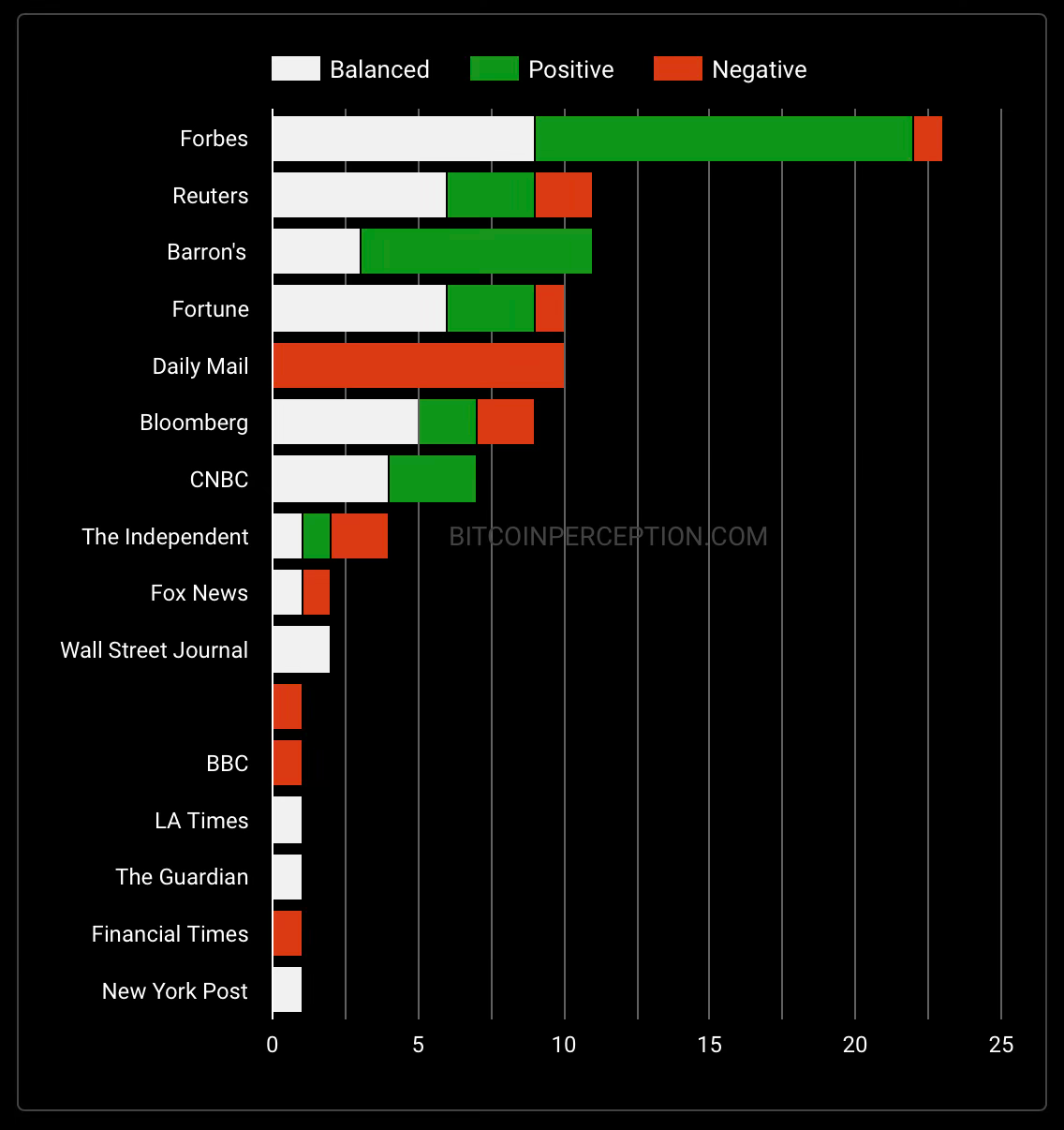Welcome to the latest edition of Bitcoin Perception.
If you want to join other readers from companies such as Swan, Galoy, Braiins, Blockstream, and others learning about how the mainstream media covers Bitcoin, subscribe below:
EOW closing Bitcoin price: $35,053
Date range: October 30 - November 5, 2023
Main Topics: Legal Proceedings, Market Movements, Environmental Impact
This week's spotlight: CNBC and Reuters
Weekly Snapshot



Main Topics Of The Week
Legal Proceedings
A significant focus has been on the regulatory scrutiny and legal actions taken against high-profile individuals and companies within the space. This includes the trials and convictions of figures like Sam Bankman-Fried, as well as the broader implications for regulation. More on this in this week’s spotlight section.
- Reuters - Britain to push ahead with rules for cryptoassets
- Reuters - Other crypto bosses in US authorities' crosshairs
Market Movements
There's considerable coverage on the should-be-normalized-by-now volatility of BTC, resulting in the usual predictions about future price movements. This always intensifies when price movements go upwards, so various outlets discuss factors that could influence these prices, such as economic policies, investor sentiment, and technological developments.
- CNBC - Bitcoin could hit $150,000 by 2025, predicts Bernstein
- Forbes - Bitcoin Prices Have Rallied Over 20% In October As ETF Anticipation Fueled Gains
Environmental Impact
Articles address the environmental concerns related to Bitcoin mining and the industry's efforts to move towards more sustainable practices. This includes the use of renewable energy sources and the impact of regulatory changes on the industry's carbon footprint.
- WSJ - In Texas, Bitcoin Springs From Gas Wells
- Forbes - Argentina's Initiative To Power Bitcoin Mining With Natural Gas
This Week's Spotlight: CNBC and Reuters


The institutions are coming!
But they are… regulatory?
Both articles from CNBC and Reuters address the theme of regulatory developments in the general cryptocurrency space. The CNBC article focuses on the UK's plans to introduce formal legislation for the crypto industry by 2024, while the Reuters article discusses Turkey's impending legislation aimed at addressing the FATF's concerns and removing the country from the grey list.
Since this is the first time we’re doing a spotlight on two articles at once, and for ease of reading, let’s do a comparative analysis:
Regulatory Intentions:
- The UK's approach is supposedly part of a “broader vision” to become a global hub for crypto-asset technology. The messaging suggests an attempt at a proactive and possibly innovation-friendly regulatory environment.
- Turkey's motivation is more reactive, primarily driven by the need to comply with international standards to combat money laundering and terrorist financing, as highlighted by the FATF.
Scope and Impact:
- The UK's proposed regulations seem to encompass a wide range of cryptoasset activities, including exchanges, custodial services, and lending, with an emphasis on market abuse and disclosures.
- Turkey's focus is more specific, targeting deficiencies in crypto regulation that have led to its greylisting by the FATF. The exact scope of the Turkish legislation is not detailed, but it is likely to be stringent.
Market Implications:
- In the UK, the introduction of formal legislation could provide clarity and stability, potentially attracting investment and fostering growth within the crypto industry, including Bitcoin.
- In Turkey, the new legislation could lead to tighter controls, which might restrict certain crypto activities but could also enhance the country's international standing and financial integrity.
Bitcoin's Position:
- Both articles touch upon regulatory changes in the broader crypto industry, which will inevitably affect Bitcoin. However, neither article distinguishes between Bitcoin and other cryptocurrencies in the context of these regulations, which is a mistake often repeated by reporters.
- The reason for this is that it's crucial to note that Bitcoin has different considerations compared to other crypto-assets that are more centralized or have different use cases.
Challenges and Considerations:
- The challenge for regulators in both the UK and Turkey will be to balance the need for oversight with the desire not to stifle innovation.
- Regulations that are too broad will inadvertently impact Bitcoin's growth and the development of its related technologies.
- Prudent regulation should be welcomed, especially in the realm of custodial products and services.
Conclusion
The regulatory moves in the UK and Turkey are indicative of a global shift towards more structured governance of the crypto market. For Bitcoin, the impact of these regulations will depend on their final form and implementation.
It is essential for the Bitcoin community and industry stakeholders to engage with policymakers to ensure that the unique properties of Bitcoin compared to the crypto industry are understood and considered.
This engagement is crucial to foster regulations that support innovation and the growth of legitimate use cases for Bitcoin, while also addressing legitimate concerns around the financial crimes and market integrity of “crypto” which undeservedly Bitcoin falls in the same category as.







